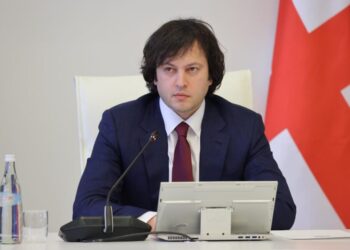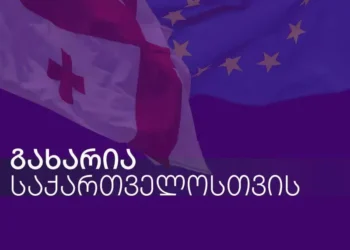The Parliament of Georgia rejected the draft law “on transparency of foreign influence” in the second reading last Thursday, following two days of heated protest from thousands of civilians who rallied on Tbilisi’s central Rustaveli Avenue.
112 legislators attended the session. 35 MPs did not support the bill in the second reading, one MP was in favor.
The Chairman of the Parliament, Shalva Papuashvili wrote a letter to the President of the Venice Commission, Claire Bazy Malaurie, asking her to disregard the earlier request to review the law and offer a legal opinion.
“Unfortunately, the initiated regulations caused differences of opinion in Georgia’s society. False narratives and labeling misled citizens and reinforced confrontation. Therefore, as a responsible actor careful about peace, stability, and prosperity, the ruling party has made a decision to withdraw support for the draft laws and stop their further legislative consideration,” he wrote.
Responses to the rejection of the draft law
“I want to congratulate Georgian society on its first victory,” President of Georgia Salome Zurabishvili said, responding to the government’s decision to withdraw the Russian draft laws from Parliament.
She claimed that it was the first sign of depolarization, because everyone had united around this one goal.
“I welcome the decision made by the government to recall the law. This decision was made taking into account the real power of the people, which was demonstrated on the streets of Tbilisi. With this unity, if we are a democratic nation, it will be impossible for a government or parliament not to take into account the will and the voices of the people.
“This will of the people was demonstrated wonderfully. This was shown not only in Georgia but also abroad. All our partners saw this extraordinary attitude and really the will of the people towards the European path of Georgia,” stated Zurabisvhili.
Khatia Dekanoidze, a member of the National Movement party noted: “this is the merit of the youth and their protest, who were not afraid of raids, poisoning, or gas. This is the merit of the unity of society. Georgian society has taken a very important step – the world rediscovered it; the country has returned to the world agenda as a European society.”
Dekanoidze pointed out that despite the efforts of the Georgian Dream, Georgia would not return to Russia, and this was the message of the youth.
“The moral condition of most people was obvious- Bidzina Ivanishvili had morally destroyed them,” she said.
The Speaker of the Russian Duma, Vyacheslav Volodin, stated that Washington was preventing Georgia from becoming a sovereign state.
“The draft laws on foreign agents submitted to the Georgian Parliament was unacceptable to the United States, as it aimed to limit the influence of Washington on the domestic political life of the country. By removing it from consideration in Parliament, Georgia lost the chance of sovereignty,” Volodin wrote on Telegram, claiming Washington had used “soft power levers” to take people to the streets.
He added his opinion that only the United States can make a decision independently, while all other countries exist under the rules of Washington.
“Any state that doesn’t agree with this is at risk of receiving a “color revolution” in response,” the Russian MP noted, adding that if the laws had been adopted, Georgia would have the right to control the funds that enter the country from abroad and which are used to finance political parties.
The PM’s Interview
Prime Minister of Georgia, Irakli Garibashvili, in an interview with the TV channel Imedi spoke about the draft law on ‘agents of foreign influence’ and the events that took place in the country on March 7-8.
Garibashvili noted that his team had decided to pass the draft law with the first hearing and send it immediately to the Venice Commission.
“If it had been heard by sensible and responsible people, who care for the future of our country, they would have understood it well. Yet there were those who do not want to understand and such were part of the people who were politically agitated, and those who simply – to put it mildly – got confused in the given circumstances.
“After forwarding the draft law to the Venice Commission, we would have had 3-4 months to continue with public discussions. Irrespective of this intention, one good thing happened when the strength of the country and wisdom of its authorities was demonstrated with a decision to withdraw the draft law. In the given circumstances, it was the most prudent decision in the context of statehood, as we on the one hand demonstrated that nobody will ever be given a chance to destabilize, create chaos, and disorder, launch a second frontline, or other atrocities,” Garibashvili said, claiming that the opposition’s aim is to keep the country in chaos and permanent destabilization and disorder. He added they might have killed several young people themselves.
“However, we said that with this step we cared for the most valuable asset of our country – stability and peace. We rejected war! We refused the War Policy, which was their key goal in holding these rallies. I am referring to a destructive, extremist group, collectively known as the UNM,” he said.
Alt-info representatives burn the EU flag near parliament
A rally of the violent, pro-Russian party Alt-Info took place in front of the parliament building on Tuesday. Participants took down the EU flag from in front of the legislative body and burned it. They hung the Georgian flag instead.
In January 2022, a law entered into force in Georgia, which stipulates punishment for insulting the official symbol of the European Union, NATO or another international organization erected/exhibited by a public institution.
“The European Union flag will be returned to its place with due honor,” Speaker Papuashvili said.
“Radicalism begets radicalism. Such behavior is unacceptable, no matter who it comes from. The EU flag will be returned to its place with due respect. As for those slogan-loving MPs, I want to tell them that they should have thought about Europe when the windows of the Parliament building were being broken. If they talk about Europe, the flag should fly in their heart and their behavior should be European. The flag will return to its place!” he added.
The Ministry of Internal Affairs released a statement regarding the removal and burning of the EU flag outside the parliament building, noting that law enforcement officers will identify and fine the violators.
“The Ministry of Internal Affairs, on the basis of Article 17418 under the Code of Administrative Offenses, launched administrative proceedings, which implies desecration of official symbols of the European Union, the North Atlantic Treaty Organization or other international organizations, or desecration of the flag or coat of arms of other states. The law enforcement officers will identify and fine the violators.” reads the statement.
Later, law enforcement officers raised a new EU flag in front of the Parliament building.
Foreign Reactions to the Protests
On Twitter, the European People’s Party expressed concerns about the Georgian Dream Party’s attempted attack on Georgia’s democratic values.
“We are concerned about the Georgian Dream Party’s attempted attack on the country’s democratic values. It was contrary to the European aspirations of the people! The ruling party proved to be the only ‘radical force’ and the ‘machine of lies’ in Georgia”, says Miriam M. Lexmann,” reads the Tweet.
MEP Viola von Cramon stated at the debate on the issue of Georgia in the European Parliament that the Georgian government is doing everything to sabotage the country’s European future, and noted that she believes that the Georgian people deserve EU membership, that the Georgian people are different from the Georgian government.
“Colleagues, all masks are off! The position of the Georgian government is clear, but the population will not accept this position. There is no way for the population of Georgia to go back to Russia. The Georgian people are very different from Georgian government. Everyone went out and made their voices heard in Brussels, Moscow, etc., not only in Tbilisi, Batumi and Kutaisi. The opinion was expressed that “you cannot burn our European identity by burning the flag of the European Union: We are fighting for freedom”.
“An article in the Constitution of Georgia requires the Government of Georgia to ensure Georgia’s accession to the European Union.
“Those who are in the Parliament betrayed their people, they forced the people of Georgia to take to the streets. The population of Georgia deserves to become a member of the European Union, even though its government does not,” said Cramon.
Fulfilling the 12 EU requirements
As a result of consultations with European partners, the ‘Lelo for Georgia’ party announced its initiative to form a public council for monitoring the fulfillment of 12 requirements of the European Union.
As noted in the statement released by the party, the task of the council will be to force Georgian Dream to fulfill all the obligations that the European Union expects from the country’s authorities and to ensure the right of Georgian citizens to be accurately informed about the challenges relating to the above process.
“Lelo will hold consultations with non-governmental organizations, civil society, and other members of the parliamentary, pro-European opposition.
The party believes that the President of Georgia, Salome Zurabishvili, should closely cooperate with the council.
“The obstacles artificially created by Georgian Dream in the process of obtaining candidate status for joining the EU caused serious concern among the partners of our country.
It has been clearly stated that the EU does not have a reliable partner from the Georgian Government. At the same time, the agenda of the European Union is for Georgia to successfully carry out the reforms that the EU expects, and thereby pave the way for the country to join the European Union. In this process, the main partners of the EU should be those organizations and parties that actually work to ensure the country’s European future,” reads the statement.
The party claims that it is clear that this government will not ensure Georgia’s accession to the European Union.
“Lelo’s position is that for the real and final success of Georgia’s European path, political changes are needed and Georgian Dream should be removed from the reins of the country’s governance through elections,” reads the statement.
The opposition parties Girchi, Droa-More Freedom, and Strategy Aghmashenebeli have announced consultations with opposition parties, non-governmental groups, and civil society on the EU’s 12 recommendations.
Strategy Agmashenebeli leader Giorgi Vashadze said that clear steps should be set.
“We have already begun consultations with the political spectrum and civic society to develop concrete steps. We will coordinate and cooperate with our Western partners in the coming session weeks,” he declared. “We must again come together, protest, and show great unity if we see the regime again turning to Russia,” he continued.
Speaker: Venice Commission did not object to Georgia adopting proposed deoligarchization law
Shalva Papuashvili noted there is no objection from the Venice Commission for Georgia to adopt the submitted law on de-oligarchization, noting however, that there are recommendations, which will be considered and a corresponding decision will be made.
“Two topics were covered in the political discussion on the bill on de-oligarchization. One was whether it was truly a translation of Ukrainian law, and the other was whether Georgia had the authority to do so given the circumstances. The conversation we had on the draft law on the transparency of foreign influence is comparable to this one. The same argument applied: To what extent it was American, and to what extent did Georgia, as opposed to America, have the authority to enact such a law? On both matters, the Venice Commission has a conclusion. The only distinction between these two laws is that in Ukraine, the registry is maintained by the Security Council under the President, whereas in Georgia, the government is in charge, which is understandable, given that the President of Georgia has other duties.
“On the second question, whether Georgia can adopt this type of law or not, there is also a judgment on this, and there is no objection in this case. They have created suggestions that the terminology be carefully clarified, which we also mentioned when we discussed this project. What it means, for instance, to be politically active or to have sway over the media, procedural safeguards, the chance to appeal, etc.
“Making sure the outcomes are proportionate is also important. There are particular recommendations that we will take into consideration, and a decision will be made as a result,” Papuashvili remarked.
In addition, as Papuashvili noted, the Venice Commission does not have any serious remarks regarding the draft law on Common Courts, and recommendations have been presented.
“The Venice Commission has no comments to make about the amendments that we have created for the second issue, the law on Common Courts. The Venice Commission in this case addressed not only this paper but also generally evaluated the recommendations provided by them in the previous two to three years, so they have proposals about additional topics at the same time. Again, they make no significant criticisms of the modifications that the Georgian Parliament has already made; but they do make some new suggestions that we will address. As you are aware, we requested a combined conclusion from the Venice Commission and the OSCE/ODIHR when we provided both documents to them. Both authorities assured us from the start that the findings would be independent. As a result, we are still awaiting the OSCE/ODIHR report on both projects; it is likely that the OSCE/ODIHR will release its findings next week. The relevant parliamentary committee will start working on these materials once we obtain the OSCE/ODIHR report. We’ll complete the task soon, ensuring that these criteria are met,” Papuashvili added.
In its interim opinion on the draft law of Georgia on de-oligarchization, the Council of Europe’s body of constitutional experts, the Venice Commission, called on the Georgian authorities to adopt systemic reforms rather than targeting specific individuals, in order to achieve “de-oligarchization.”
Compiled by Ketevan Skhirtladze, stories by Team GT














